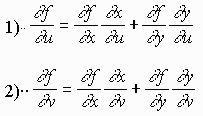The Chain Rule
I. Quiz
II. Homework
III. Review Of The Chain Rule For One Variable
Recall that if y = f(x) and x = x(t) then
dy/dt = dy/dx dx/dt
Suppose that y = f(x,y) = x2 + 2x - xy + y2 and x(t) = t2 +1, y(t) = t3 - t2
Then what is dy/dt for t = 2
Solution: f can be written as
(x(t))2 + 2(x(t)) - x(t)y(t) + (y(t))2
Hence the derivative is
2x(t)(x'(t)) + 2x'(t) - (x(t)y'(t) + y(t)x'(t)) + 2y(t)y'(t) etc.
Instead we use the chain rule:

= (2x + 2 - y)(2t) + (-x + 2y)(3t2 - 2t)
When t = 2, x(2) = 5 and y(2) = 8 - 4 = 4 hence
df/dt = 2(5 + 2 - 4)((2)(2) + (-5 + 2(4))(3(4) - 2(2)) = 48
Exercise:
Let f(x,y) = 2x -3xy and x(theta) = 2cos theta and y(theta) = 2sin(theta)
Find df/dtheta
IV. The Chain Rule for 2 Variables
Let f(x,y) be a 2 variable function and x = x(u,v) and y = y(u,v) then

Example: Polar Coordinates
Let f(x,y) = x2y and x = rcos(theta) and y = rsin(theta)
then
delf/delr = delf/delx delx/delr + delf/dely dely/delr = 2xycos(theta + x2sin theta)
= 2r2cos2(theta)sin(theta) + r2cos2(theta)sin(theta) = 3r2cos2(theta)sin(theta)
Exercise
Let f(x,y = x - 2y2 and x(u,v) = u - 2v, y(u,v) = 2u + v
find delf/delu and delf/delv
V. Implicit Differentiation
Suppose we have the ellipsoid
x2 + y2 + 2z2 = 1
and we want to find delz/delx and delz/dely
We write
f(x,y,z) = f(x,y,z(x,y)) = 0
but 0 = delf/delx = delf/delx delx/delx + delf/dely dely/delx + delf/delz delz/delx
Where the first factors correspond to the partials with respect to the first, second and third variables respectively and the second factors are with respect to the actual x.
We have delx/delx = 1 and dely/delx = 0
Hence 0 = delf/delx + delf/delz delz/delx
So that
delz/delx = -delf/delx / delf/delz = -fx/fz
for the ellipsoid:
delf/delx = 2x/4z = x/2z